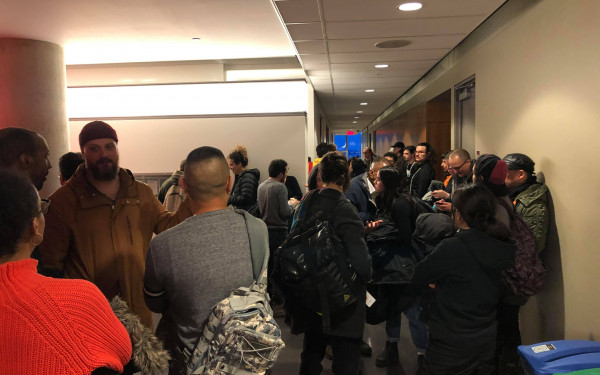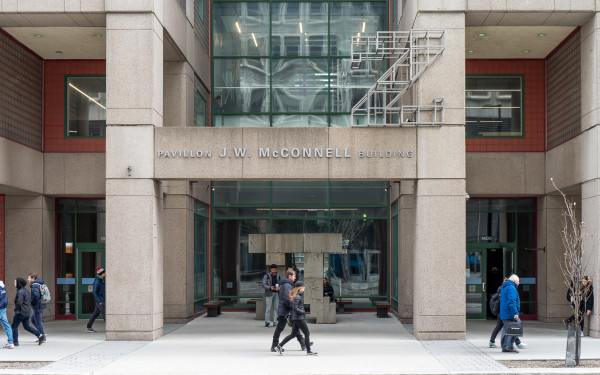Editorial: Against Online Opt-Out and Faculty Representation Referendum Questions
Online Opt-Out Endangers Student Groups Vital to Diversity and Equity at Concordia
Disclosure: The Link is a fee-levy group.
If you’re reading this: Vote No.
This week’s Concordia Student Union by-election includes referendum questions that threaten student life and equity.
Two of these questions have generated a lot of controversy over the past weeks.
The first reads: “Do you support Concordia University bringing the opt-out process online for student fee levy organizations?”
This is an existential threat to the groups that make university worthwhile. Some students depend on the advocacy and services these organizations provide.
Online opt-out will actually make conditions harder for student groups to do their vital work, to the detriment of students. It’s falsely presented as an option that will make the lives of students easier.
Online opt-out has the potential to almost completely defund fee-levy groups, as people who are indifferent or actively want to defund these groups will not think twice before opting out.
As many student groups rely on this money to operate, this will almost certainly cause the gutting or shuttering of these important groups.
How important are fee-levy groups?
Many of these fee-levy groups exist to offer support to students in need. The work these groups do has a real life impact.
For one, People’s Potato offers daily lunches on a pay-what-you-can basis to the Concordia community. People’s Potato costs $0.43 per credit which, if you take four classes, is less than what it costs for a single take-out meal.
Queer Concordia, which costs students $0.02 per credit, allows LGBTQ+ students to find a sense of community and a space to rest and feel at home.
Some students might not be able to access services elsewhere.
That’s why many fee levy groups have been calling out the CSU’s online opt-out referendum question. We fear it will result in the defunding of key organizations.
The current CSU hasn’t expressly said that this is their goal, but it’s certainly a consequence that will come if online opt-out is implemented.
We acknowledge that tuition is expensive, but decreasing the cost of attending university by defunding essential fee-levy groups is a bad faith argument.
At the same time, there is another referendum question seeking to add an increase of $2.08 per credit that can’t be opted out of. This would mean $31.20 in new fees per semester in exchange for free Stingers games—of which some are already free for Concordia students— and a CrossFit gym, among other things. Including these new fees, the total is $5 per credit, or $75 for a five class semester—about $2 more than all fee-levies combined.
The dissonance between these two referendum questions is incredible. Those advocating for online opt-out claim they support “economic freedom,” to let students have a say on where they spend their money and choose to opt-out of services they won’t use. Yet, on the same ballot, they propose a ridiculous fee you can’t opt out of for services you probably won’t use and don’t have a say on how the money is spent.
Another question reads: “Do you support giving all faculties equal representation on the Council of Representatives by changing the structure to three Arts seats, three Science seats, three Gina Cody seats, three JMSB seats, three Fine Arts seats, and one Independent Student seat?”
This situation would be an unfair representation of the number of students in each faculty, and would not make the CSU council more balanced.
Currently, the system is proportional based on the number of students in each faculty. In the proposed system, however, three seats would be allotted to each of five faculties, with arts and science being considered two separate faculties, along with one seat for an independent student.
Not only will the number of seats on CSU council be reduced, the so-called equal representation will also work to undermine the voices of faculties with higher numbers of students. The result wouldn’t be equity but inequity, with arts and science students paying the price.
Both proposals echo measures implemented in Ontario under Premier Doug Ford.
Ford’s government lowered the number of city councillors in Toronto from 47 to 25, while also launching the Student Choice Initiative, which deemed some student fees, including fee-levy groups, as “non-essential,” allowing students to opt out of them.
The result in both cases was confusion and chaos.
Cutting services to students and lowering the number of seats on CSU council will not make students’ lives better or easier. All it would do is make all of our time here harder.
Our time at Concordia should be spent supporting our fellow students, not making their lives worse just to save a few bucks. Our energy should be spent engaging the opportunities on campus, not putting them in jeopardy. A vote to enact these referendum questions is a vote to make Concordia a worse place for all students.






